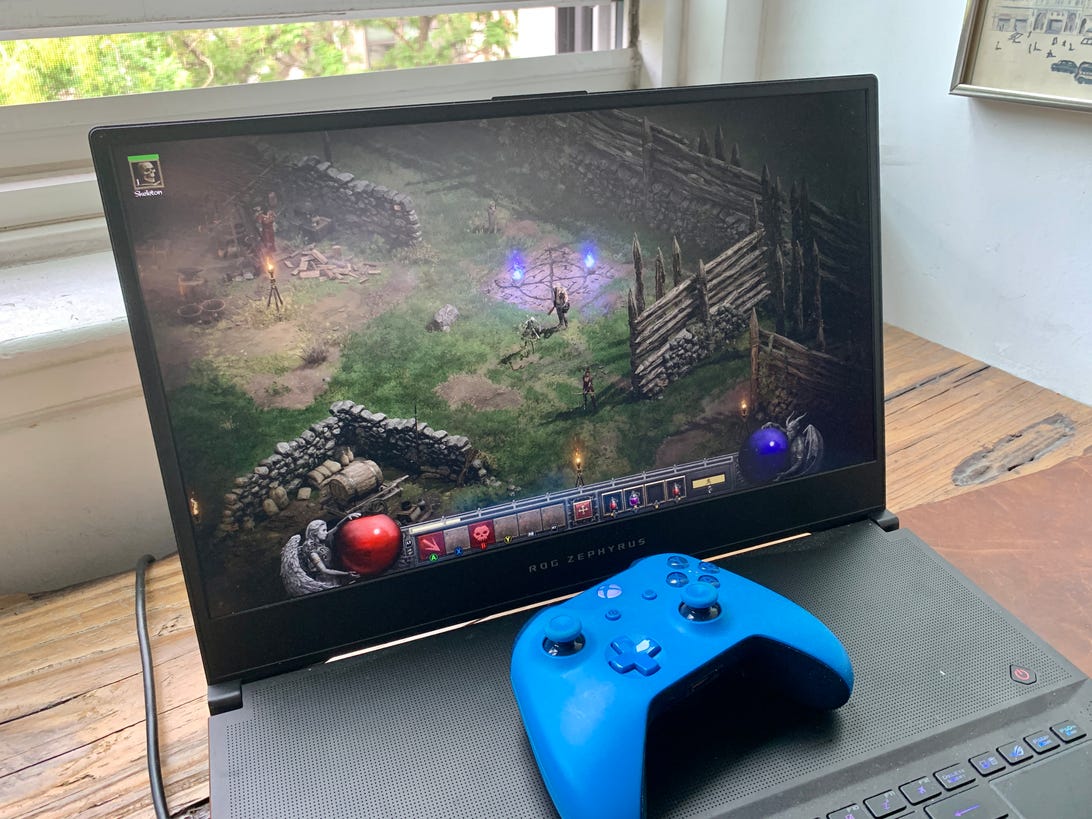
Dan Ackerman/CNET
In a break from recent high-concept, high-flash games such as Deathloop or Ratchet & Clank, Diablo II: Resurrected is delightfully retro in spirit and practice. It’s a nearly 1:1 remake of the original Diablo II, first released for PCs and Macs in 2000. The game is so faithful to the original that you can flick the enhanced graphics on and off at will without missing a beat.
At first, I didn’t love that concept. In a heated Slack convo a few weeks ago, I argued, “There’s a difference between a remake that creates a new, original work — like Scarface (1932) vs. Scarface (1983) — and something like Gus Van Sant’s lazy shot-for-shot Psycho (1998) remake.” After playing a bit in both the beta and final version game, I’ve come to appreciate Resurrected’s retro pleasures, although a game from 20 years ago is going to feel dated no matter what.
Diablo II: Resurrected feels like it could be a perfect Apple Arcade game, or a fun, casual game for regular work-from-home laptops. In practice, the required PC specs are reasonable, but not as flexible as something like Fortnite, which can run (if roughly) on your non-gaming laptop’s integrated graphics.
Instead, the published specs for Diablo II: Resurrected are as follows:
Diablo II: Resurrected required specs
| Minimum requirements | Recommended specs | |
| OS | Windows 10 | Windows 10 |
| CPU | Intel Core i3-3250 or AMD FX-4350 | Intel Core i5-9600k or AMD Ryzen 5 2600 |
| GPU | Nvidia GTX 660 or AMD Radeon HD 7850 | Nvidia GTX 1060 or AMD Radeon RX 5500 XT |
| RAM | 8GB | 16GB |
Note there are no system specs listed for Macs. Even though the original Diablo II was popular on Macs for many years, the new version is PC-only (plus Xbox, PlayStation and Switch, of course). If you’re looking to try the old 2000-era game on your Mac, Blizzard has instructions here.
That’s too bad, because I think this game would have been perfect for a 24-inch iMac, and I’ve been able to play games like Baldur’s Gate 3 and Hades perfectly fine on an M1 MacBook Air.
You’re also out of luck if you’re trying to play on a laptop without a dedicated Nvidia or AMD graphics card. The game does not support even Intel’s better Iris GPUs. In most cases, it’ll simply refuse to launch, as noted by many beta testers in the game’s beta forums.
I tried my luck on three Windows PCs. On a desktop with an Intel Core i7-6700 and a single Nvidia 1080 GPU, it ran great, even at 4K resolution (yes, it was hooked up to my TV). Also great was a gaming laptop with an Intel Core i7-8750 and a Nvidia 2080 Max-Q GPU. But a Dell XPS 13 with an Intel Core i7-1065G7 and Intel integrated Iris Plus graphics was a no-go. The game would simply pop up an error message when I tried to launch it. On the same Dell, I was able to download and play Diablo 3 on it perfectly fine.
The lowest-end compatible Nvidia GeForce 660 GPU is about 10 years old at this point, and technically it’s still faster than the best integrated Intel Iris Xe graphics, although only by a little. Most laptops, even high-end ones, don’t include dedicated Nvidia or AMD graphics hardware, unless they’re intended for gaming or creative work.
That means that even if you’re an old-school Diablo II fan, one who’s been waiting years to get back into the fight, Diablo II: Resurrected probably isn’t going to run on your work-from-home laptop. Fortunately, you can always play it on a console instead.









